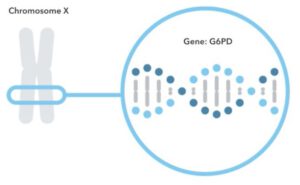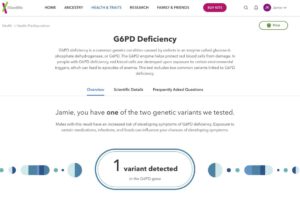This week, 23andMe updated its G6PD Deficiency Genetic Health Risk Report.* The update includes testing for an additional variant linked to G6PD deficiency, a condition that can lead to episodes of anemia.
The update makes this report more comprehensive and relevant to more people.
The G6PD Report
Two of the most common variants linked to G6PD Deficiency are V68M and S188F. Until today, 23andMe reported on just one of those variants, V68M. That variant is most common in people of African descent. It is also found in people of African ancestry, including Hispanic or Latino descent. Now, 23andMe has added another common variant, S188F, making the report relevant for more people. The S188F variant is most common in people of Southern European, Kurdish, Jewish, Middle Eastern, Central Asian, and South Asian descent.
Together these two variants make 23andMe’s report more comprehensive. The update is also consistent with 23andMe’s mission to ensure people, all people, can access, understand, and benefit from the human genome. This report is another one of our efforts to improve diversity in our reports.
The effort to update the report was informed, in part, by discussions with the g6pd Deficiency Foundation, which raises awareness of this little-known disease. The foundation encouraged 23andMe to expand the report’s scope by including this additional variant.
“This is a giant step for screening for G6PD deficiency and the timing is perfect,” said Keely Harris, President, and founder of the g6pd Deficiency Foundation.
The G6PD Protein
Harris said the foundation is currently working on a new awareness campaign.
The variants included in the report can reduce the levels or activity of an enzyme called glucose-6-phosphate dehydrogenase, or G6PD. This protein helps protect red blood cells from damage. People with G6PD deficiency usually don’t have symptoms unless exposed to certain factors, such as certain medications, infections, or foods (like fava beans).
Specific triggers may vary from person to person, and many people with the condition do not experience symptoms. In a person with G6PD deficiency, a trigger can result in the destruction of red blood cells. If too many red blood cells are destroyed, this can sometimes — though not always — lead to episodes of anemia, which can be characterized by symptoms such as dark urine, fatigue, pale skin, shortness of breath, and more.
Worldwide Impact
The National Institutes of Health estimates that about 400 million people worldwide have the condition. It is most common in people from certain parts of Africa, Asia, the Middle East, and the Mediterranean.
The G6PD gene is found on the X chromosome. Because it is inherited, males are more likely to have G6PD deficiency than females. About one in ten African American males has G6PD deficiency. Because these variants are so common among African Americans, it is not unusual for African American women to also have this condition.
23andMe’s test doesn’t diagnose G6PD deficiency. Instead, it detects two common variants linked to G6PD deficiency. 23andMe’s updated G6PD Deficiency Genetic Health Risk report* is one of more than 10 Health Predisposition reports offered to new and existing Health + Ancestry Service customers. These include reports that meet FDA requirements for Genetic Health Risks and reports powered by 23andMe research.
Note:
*The 23andMe PGS test uses qualitative genotyping to detect select clinically relevant variants in the genomic DNA of adults from saliva for the purpose of reporting and interpreting genetic health risks. It is not intended to diagnose any disease. Your ethnicity may affect the relevance of each report and how your genetic health risk results are interpreted. Each genetic health risk report describes if a person has variants associated with a higher risk of developing a disease, but does not describe a person’s overall risk of developing the disease. The test is not intended to tell you anything about your current state of health, or to be used to make medical decisions, including whether or not you should take a medication, how much of a medication you should take, or determine any treatment. The G6PD genetic health risk report is indicated for reporting of the V68M and S188F variants in the G6PD gene and describes if a person has one or more variants linked to G6PD deficiency and an increased risk for episodes of anemia. The variants included in this report are most studied in people of African, Southern European, Kurdish Jewish, Middle Eastern, Central Asian, and South Asian descent.